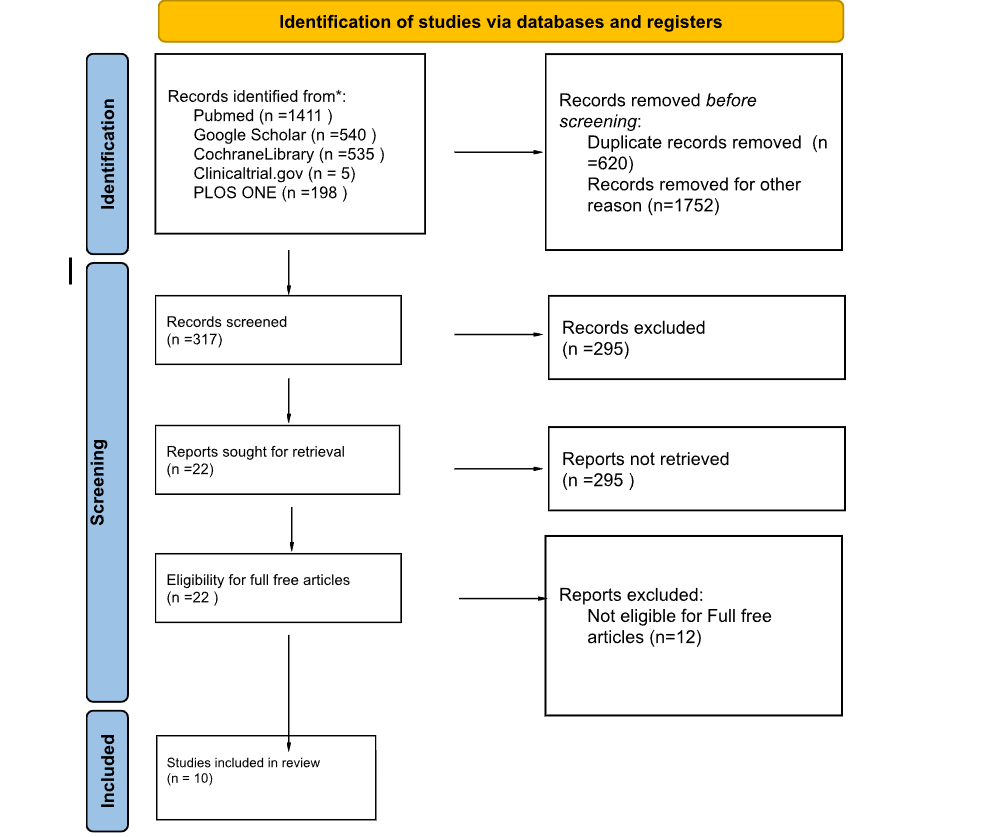Sunday Poster Session
Category: Infections and Microbiome
P1299 - Comparison of Probiotic vs Prebiotic Supplementation in Gut Microbiome Reconstitution: Systematic Review and Meta-Analysis
Sunday, October 26, 2025
3:30 PM - 7:00 PM PDT
Location: Exhibit Hall

Bhavani Gangineni, MD (she/her/hers)
Guntur Medical College
Harlingen, TX
Presenting Author(s)
Chandana Tadigotla, MBBS1, Ashwith Reddy Gaddam, MD2, Bhavani Gangineni, MD3, Sai Pujitha Ramireddy, MBBS4, Kushaghar Singla, MD5, Diksha Mahadeva Gowda, MBBS6, Omer Farooq Mohammed, MBBS7, Adi Prasad Bodapati, MD8, Sri Lakshmi Ananya Bokka, MBBS9, Siddhi P. Shah, MBBS10, Faizan ul Hussain Mohammed, MBBS11, Susmitha Nallagatla, MD12, Binay Panjiyar, MD13
1PES INSTITUTE OF MEDICAL SCIENCES AND RESEARCH, Ananthapur, Andhra Pradesh, India; 2NYMC at St. Mary’s General hospital amd st clares health, Parsippany, NJ; 3Guntur Medical College, Harlingen, TX; 4Mallareddy institute of medical sciences, Hyderabad, Andhra Pradesh, India; 5University of Pennsylvania Health System, Claymont, DE; 6Mayo Clinic, Rochester, MN; 7Osmania General Hospital and Medical College, Hyderabad, Telangana, India; 8Texas Tech University Health Sciences Center, Odessa, TX; 9Gandhi Medical College & Hospital, Hyderabad, Telangana, India; 10HBT Medical College and Dr. R.N. Cooper Municipal General Hospital, Thane, Maharashtra, India; 11Osmania Medical College, Karimnagar, Telangana, India; 12Davao medical school foundation, Guntur, Andhra Pradesh, India; 13NorthShore University Hospital, Manhasset, NY
Introduction: The gut microbiome plays a vital role in maintaining immune, metabolic, and gastrointestinal health. Dysbiosis or microbial imbalance, contributes to many chronic diseases.Dietary interventions, such as probiotics( live microorganisms) and prebiotics(non-digestible compounds that stimulate beneficial microbes), have increased exponentially to restore microbial balance.This systematic review evaluates the efficacy of probiotic vs prebiotic supplementation in reconstituting gut microbiome function and diversity.
Methods: Four reviewers independently searched four different resources published in the last ten years that evaluated probiotic or prebiotic supplementation in adults, with preset inclusion and exclusion criteria. The risk of bias was assessed independently using the Cochrane tool, with disagreements resolved.
Results: Probiotics significantly increased Lactobacillus and Bifidobacterium populations (SMD: 0.48; 95% CI: 0.30–0.66; I² = 20%), with mild improvements in GI symptoms (bloating, stool consistency).Effects on microbial diversity were modest and inconsistent(SMD: 0.18; 95% CI: −0.01 to 0.37; I² = 45%).SCFA levels showed no significant change.Inflammatory markers(CRP, IL-6) decreased slightly(SMD: −0.22; 95% CI: −0.39 to −0.05; I² = 30%).
Prebiotics, primarily inulin, GOS, and resistant starch, resulted in a increase in overall microbial diversity (SMD: 0.53; 95% CI: 0.35–0.70; I² = 25%) and SCFA production, particularly butyrate (SMD: 0.40; 95% CI: 0.21–0.59; I² = 28%) and also significantly reduced systemic inflammation (SMD: −0.37; 95% CI: −0.52 to −0.22; I² = 15%) and endotoxin levels. Clinically, they improved stool frequency and consistency more consistently than probiotics.There were no reports of serious adverse events in either group.
Discussion: Both probiotics and prebiotics positively affect gut microbiota, but they operate through different mechanisms. Prebiotics appear more effective for comprehensive microbiome reconstitution by enhancing microbial diversity and metabolic function. Probiotics may be preferable for targeted strain support and immune regulation. More randomised controlled trials (RCTs) are needed to refine the therapeutic use and guide personalised microbiome-based interventions.

Figure: image 1: prisma 2020 diagram
Disclosures:
Chandana Tadigotla indicated no relevant financial relationships.
Ashwith Reddy Gaddam indicated no relevant financial relationships.
Bhavani Gangineni indicated no relevant financial relationships.
Sai Pujitha Ramireddy indicated no relevant financial relationships.
Kushaghar Singla indicated no relevant financial relationships.
Diksha Mahadeva Gowda indicated no relevant financial relationships.
Omer Farooq Mohammed indicated no relevant financial relationships.
Adi Prasad Bodapati indicated no relevant financial relationships.
Sri Lakshmi Ananya Bokka indicated no relevant financial relationships.
Siddhi Shah indicated no relevant financial relationships.
Faizan ul Hussain Mohammed indicated no relevant financial relationships.
Susmitha Nallagatla indicated no relevant financial relationships.
Binay Panjiyar indicated no relevant financial relationships.
Chandana Tadigotla, MBBS1, Ashwith Reddy Gaddam, MD2, Bhavani Gangineni, MD3, Sai Pujitha Ramireddy, MBBS4, Kushaghar Singla, MD5, Diksha Mahadeva Gowda, MBBS6, Omer Farooq Mohammed, MBBS7, Adi Prasad Bodapati, MD8, Sri Lakshmi Ananya Bokka, MBBS9, Siddhi P. Shah, MBBS10, Faizan ul Hussain Mohammed, MBBS11, Susmitha Nallagatla, MD12, Binay Panjiyar, MD13. P1299 - Comparison of Probiotic vs Prebiotic Supplementation in Gut Microbiome Reconstitution: Systematic Review and Meta-Analysis, ACG 2025 Annual Scientific Meeting Abstracts. Phoenix, AZ: American College of Gastroenterology.
1PES INSTITUTE OF MEDICAL SCIENCES AND RESEARCH, Ananthapur, Andhra Pradesh, India; 2NYMC at St. Mary’s General hospital amd st clares health, Parsippany, NJ; 3Guntur Medical College, Harlingen, TX; 4Mallareddy institute of medical sciences, Hyderabad, Andhra Pradesh, India; 5University of Pennsylvania Health System, Claymont, DE; 6Mayo Clinic, Rochester, MN; 7Osmania General Hospital and Medical College, Hyderabad, Telangana, India; 8Texas Tech University Health Sciences Center, Odessa, TX; 9Gandhi Medical College & Hospital, Hyderabad, Telangana, India; 10HBT Medical College and Dr. R.N. Cooper Municipal General Hospital, Thane, Maharashtra, India; 11Osmania Medical College, Karimnagar, Telangana, India; 12Davao medical school foundation, Guntur, Andhra Pradesh, India; 13NorthShore University Hospital, Manhasset, NY
Introduction: The gut microbiome plays a vital role in maintaining immune, metabolic, and gastrointestinal health. Dysbiosis or microbial imbalance, contributes to many chronic diseases.Dietary interventions, such as probiotics( live microorganisms) and prebiotics(non-digestible compounds that stimulate beneficial microbes), have increased exponentially to restore microbial balance.This systematic review evaluates the efficacy of probiotic vs prebiotic supplementation in reconstituting gut microbiome function and diversity.
Methods: Four reviewers independently searched four different resources published in the last ten years that evaluated probiotic or prebiotic supplementation in adults, with preset inclusion and exclusion criteria. The risk of bias was assessed independently using the Cochrane tool, with disagreements resolved.
Results: Probiotics significantly increased Lactobacillus and Bifidobacterium populations (SMD: 0.48; 95% CI: 0.30–0.66; I² = 20%), with mild improvements in GI symptoms (bloating, stool consistency).Effects on microbial diversity were modest and inconsistent(SMD: 0.18; 95% CI: −0.01 to 0.37; I² = 45%).SCFA levels showed no significant change.Inflammatory markers(CRP, IL-6) decreased slightly(SMD: −0.22; 95% CI: −0.39 to −0.05; I² = 30%).
Prebiotics, primarily inulin, GOS, and resistant starch, resulted in a increase in overall microbial diversity (SMD: 0.53; 95% CI: 0.35–0.70; I² = 25%) and SCFA production, particularly butyrate (SMD: 0.40; 95% CI: 0.21–0.59; I² = 28%) and also significantly reduced systemic inflammation (SMD: −0.37; 95% CI: −0.52 to −0.22; I² = 15%) and endotoxin levels. Clinically, they improved stool frequency and consistency more consistently than probiotics.There were no reports of serious adverse events in either group.
Discussion: Both probiotics and prebiotics positively affect gut microbiota, but they operate through different mechanisms. Prebiotics appear more effective for comprehensive microbiome reconstitution by enhancing microbial diversity and metabolic function. Probiotics may be preferable for targeted strain support and immune regulation. More randomised controlled trials (RCTs) are needed to refine the therapeutic use and guide personalised microbiome-based interventions.

Figure: image 1: prisma 2020 diagram
Disclosures:
Chandana Tadigotla indicated no relevant financial relationships.
Ashwith Reddy Gaddam indicated no relevant financial relationships.
Bhavani Gangineni indicated no relevant financial relationships.
Sai Pujitha Ramireddy indicated no relevant financial relationships.
Kushaghar Singla indicated no relevant financial relationships.
Diksha Mahadeva Gowda indicated no relevant financial relationships.
Omer Farooq Mohammed indicated no relevant financial relationships.
Adi Prasad Bodapati indicated no relevant financial relationships.
Sri Lakshmi Ananya Bokka indicated no relevant financial relationships.
Siddhi Shah indicated no relevant financial relationships.
Faizan ul Hussain Mohammed indicated no relevant financial relationships.
Susmitha Nallagatla indicated no relevant financial relationships.
Binay Panjiyar indicated no relevant financial relationships.
Chandana Tadigotla, MBBS1, Ashwith Reddy Gaddam, MD2, Bhavani Gangineni, MD3, Sai Pujitha Ramireddy, MBBS4, Kushaghar Singla, MD5, Diksha Mahadeva Gowda, MBBS6, Omer Farooq Mohammed, MBBS7, Adi Prasad Bodapati, MD8, Sri Lakshmi Ananya Bokka, MBBS9, Siddhi P. Shah, MBBS10, Faizan ul Hussain Mohammed, MBBS11, Susmitha Nallagatla, MD12, Binay Panjiyar, MD13. P1299 - Comparison of Probiotic vs Prebiotic Supplementation in Gut Microbiome Reconstitution: Systematic Review and Meta-Analysis, ACG 2025 Annual Scientific Meeting Abstracts. Phoenix, AZ: American College of Gastroenterology.
